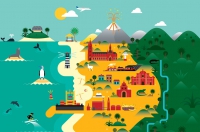Teacher’s pick
For an expert opinion, we’ve reached out to Maria Semina, a teacher at ITMO’s Foreign Language Training Center, who shared with us several useful websites, plus a bonus source for those who want to learn more about Russian culture.
- Learn Russian. With a communicative approach at its core, this free website offers a plethora of reading, listening, grammar, and writing activities, including a phonetics course, dialogues, and quizzes – all accompanied with audio materials and historical notes.
- Youna. Unlike Learn Russian, Youna is a subscription platform with biannual and yearly membership options. With a free trial, you have access to a limited number of grammar, reading, and listening exercises, as well as useful words and phrases from A1 to C1. The website is available both in Russian and English.
- Urya. Though primarily meant for Russian teachers, the platform is an excellent source of quality materials for studying Russian the interactive way, such as reading comprehension exercises, tongue-twisters, grammar tables, crosswords, and so on. The website is in Russian.
- Yellow Blue Bus. Those who are more confident in their Russian (B1 or higher) may practice their skills and educate themselves culture-wise through podcasts like Yellow Blue Bus. This is a great place to dive deep into the Russian psyche and diverse phenomena, from dacha to Russian humor. The podcast is available on various podcast platforms, including Yandex.Music, Apple Podcasts, and SoundCloud.
- Quizlet and its Russian equivalent Barabook. Both are excellent web learning tools, also available as apps, that let you master any subject through flashcards, games, tests, and various revision modes.
Students’ pick
Students of the Foundation Program and self-learners know the journey firsthand and have some tricks up their sleeves to make it far more enjoyable for you, too:
- YouTube channels: Easy Russian (real-life conversation on any topic possible, from groceries and traditions to dates), Real Russian Club (word marathons, famous Russians, grammar lessons, and more), and Amazing Russian (grammar and vocab for all levels).
- Podcasts: Comprehensible Russian Podcast (an educational podcast on all things Russia available on Yandex.Music, Apple Podcasts, and Spotify).
- Apps: Tandem (a language exchange app with learners and natives from all over the world, available on iOS and Google Play).
Learning Russian isn’t all roses – but it’s also plenty of fun, says Prince Odinaka, a graduate of the Foundation Program from Nigeria, when describing his learning experience.
Read the full story to get more insights into our students’ learning experiences and discover even more resources for your use.
Editor’s pick
- Memorize themed vocab. Knowing how to say “Hello” and “How can I get to…?” in a foreign language may be a lifesaver. To learn a bit of Russian and a bit more, you can check out our Russian Language series, which covers anything from the basics to profound meanings behind Russian words and some tongue-twisters to test your powers (for beginners and pro).
- Listen to music in Russian. There is music to any liking out there, from chart-topping jams (part 1 and part 2) to timeless classics, and it’s a top-notch tool to train your ears – and voice.
- Watch content in Russian. If you enjoy video content more, find your next favorite Russian TV series or blogger to follow here and here.
- Journal in Russian. When next reflecting on your day, try to write in the language you’re learning. This way, you will be able to accomplish not one, but several goals at once – free your mind, polish your language skills, and even benchmark your progress over time. Here are a few writing prompts you can test out.
- Find a tutor. If you need a teacher at your back, you might want to turn to a tutor who will help you along your journey – and with this guide, you’ll have no trouble finding one in Russia.
Finding a language-learning friend or a community is yet another great way to up your language game. ITMO University offers a number of language learning opportunities for current and prospective students, including speaking clubs (in Russian and not only), a language camp, and a whole preparatory course for future students.




